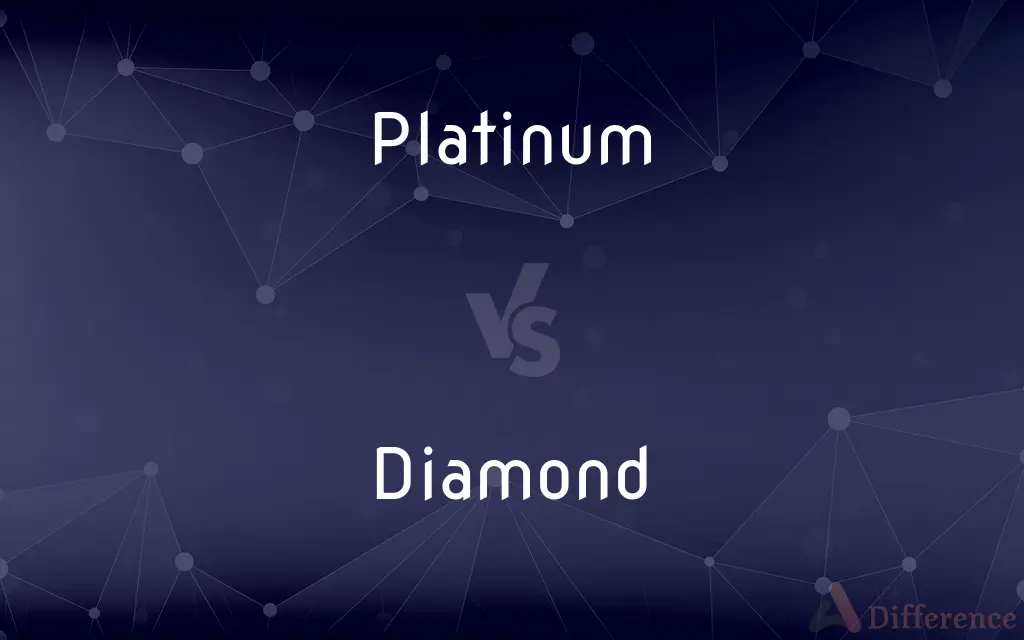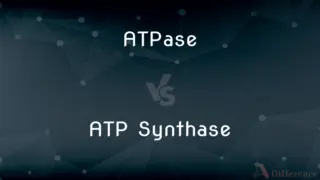Platinum vs. Diamond — What's the Difference?
By Fiza Rafique & Maham Liaqat — Published on February 21, 2024
Platinum is a dense, malleable metal used in jewelry and industrial applications, known for its white hue and resistance to tarnish. Diamonds are carbon allotropes, famed for their hardness and brilliance, commonly used in jewelry and cutting tools.

Difference Between Platinum and Diamond
Table of Contents
ADVERTISEMENT
Key Differences
Platinum, a precious metal, is celebrated for its durability, resistance to corrosion, and hypoallergenic properties, making it a popular choice for fine jewelry, especially wedding and engagement rings. Diamonds, on the other hand, are prized for their unmatched hardness on the Mohs scale, making them ideal for use in jewelry that lasts generations and in industrial applications for cutting and grinding.
The value of diamonds is determined by the "Four Cs": carat, cut, clarity, and color, which assess a diamond's quality and rarity. Platinum's value is primarily influenced by its purity and weight, alongside market demand for precious metals. While both are symbols of luxury and status, diamonds are often associated with timeless elegance and love, whereas platinum is sought after for its sophisticated, understated appearance and durability.
In terms of physical properties, platinum's high melting point and density make it ideal for securing precious gemstones in jewelry, offering a secure setting that is less likely to wear down over time. Diamonds, being the hardest natural material, are not only used in jewelry but also in various industrial applications, where their cutting prowess can be utilized.
The choice between platinum and diamond often comes down to the intended use and personal preference. For those seeking a durable metal for their jewelry, platinum is an excellent choice. Conversely, diamonds are favored for their sparkle and as a symbol of enduring love. Despite their different characteristics and uses, both hold significant value in their respective markets and are cherished for their beauty and rarity.
Comparison Chart
Composition
Metal (Element)
Carbon Allotrope
ADVERTISEMENT
Primary Use
Jewelry, Industrial Applications
Jewelry, Cutting Tools
Value Determinants
Purity, Weight, Market Demand
Carat, Cut, Clarity, Color
Physical Properties
Dense, Malleable, Corrosion Resistant
Hardest Natural Material, Brilliant
Symbolism
Durability, Sophistication
Love, Elegance
Color
Silvery White
Colorless to Various Colors
Allergenic Potential
Hypoallergenic
Generally Hypoallergenic
Market
Precious Metals
Gemstones, Industrial Diamonds
Durability
Resistant to Wear and Tarnish
Resistant to Scratching
Care and Maintenance
Requires Minimal Maintenance
Requires Cleaning to Maintain Brilliance
Compare with Definitions
Platinum
Used in industrial applications.
Platinum’s high melting point makes it ideal for high-temperature industrial equipment.
Diamond
Hardest natural substance.
The diamond’s hardness ensures that my engagement ring is durable and long-lasting.
Platinum
Precious metal known for durability.
The platinum ring’s luster and strength make it perfect for everyday wear.
Diamond
Comes in various colors.
The rare pink diamond caught everyone's attention with its unique hue.
Platinum
Popular in fine jewelry.
Platinum’s hypoallergenic properties make it a favored metal for sensitive skin.
Diamond
Valued by the Four Cs.
The diamond's cut and clarity determine its sparkle and value.
Platinum
Silvery white color.
The platinum band complemented the diamond's brilliance beautifully.
Diamond
Symbol of enduring love.
He gave her a diamond ring as a testament to their everlasting love.
Platinum
Resistant to tarnish.
Her platinum necklace has maintained its shine for years without tarnishing.
Diamond
Used in cutting tools.
Diamond-tipped tools are essential for cutting through tough materials in construction.
Common Curiosities
Can platinum scratch or tarnish?
Platinum is highly resistant to tarnish and wear, but it can develop a patina over time, which can be polished.
Why are diamonds considered valuable?
Diamonds are valued for their rarity, brilliance, and the stringent criteria of the Four Cs, which assess their quality and rarity.
How are the prices of platinum and diamonds determined?
Platinum prices are influenced by its purity, weight, and market demand, while diamond prices depend on the Four Cs.
Is diamond or platinum more expensive?
The cost can vary; diamonds are typically priced based on the Four Cs, while platinum is priced by weight and market rates. The value of a diamond piece can exceed that of platinum due to the gemstone's characteristics.
Are diamonds used for anything besides jewelry?
Yes, due to their hardness, diamonds are used in industrial applications for cutting, grinding, and drilling.
What does the color of a diamond indicate?
A diamond's color can range from colorless to various shades, with colorless diamonds being the most sought-after. Colors are graded, and certain rare colors, like pink or blue, can increase a diamond's value.
How should diamonds be cared for?
Diamonds should be regularly cleaned and inspected for any loose settings to maintain their brilliance and ensure their security.
What makes platinum ideal for jewelry?
Platinum's durability, tarnish resistance, and hypoallergenic properties make it ideal for jewelry, especially pieces worn daily.
What care does platinum jewelry require?
Platinum jewelry requires minimal maintenance, needing only occasional cleaning and polishing to maintain its luster.
Can platinum hold any gemstone?
Yes, platinum's density and strength make it suitable for setting a wide range of gemstones securely.
Share Your Discovery

Previous Comparison
DNA Testing vs. Paternity Testing
Next Comparison
ATPase vs. ATP SynthaseAuthor Spotlight
Written by
Fiza RafiqueFiza Rafique is a skilled content writer at AskDifference.com, where she meticulously refines and enhances written pieces. Drawing from her vast editorial expertise, Fiza ensures clarity, accuracy, and precision in every article. Passionate about language, she continually seeks to elevate the quality of content for readers worldwide.
Co-written by
Maham Liaqat













































